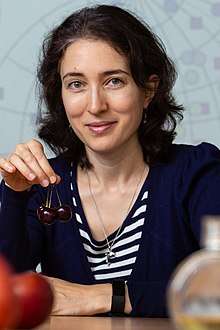Tatyana Sharpee
Tatyana Sharpee is an Adjunct Associate Professor at the Department of Physics at University of California, San Diego, and spearheads a research group at the Computational Neurobiology Laboratory at Salk Institute. She also serves as the Helen McLorraine Developmental Chair in Neurobiology at the Institute.[1]
Tatyana Sharpee | |
|---|---|
 | |
| Scientific career | |
| Fields | Computational Neuroscience |
| Institutions | Salk Institute for Biological Studies |
Early life and education
Sharpee was interested in science from childhood, and was encouraged by her grandfather.[2] She obtained her BS from Taras Shevchenko National University of Kyiv in Ukraine, and moved on to Michigan State University for her PhD in theoretical physics.[3] In 2015, she received a National Science Foundation grant to study feature selectivity and invariance in deep neural architectures. Her work has been focused on probing how our brains represent complex transformations of the same object to recognize it.[4] Sharpee uses state-of-the-art deep learning algorithms to understand where the algorithms are failing at complex object transformations[5]. The NSF grant also enabled her lab to study how the auditory system of the brain works based on large scale simulations of neural networks[6]. This latter work not only has potential to improve the current hearing aid technology, but also could reveal therapeutic paths to treat a number of attention deficit and psychiatric disorders which depend on the corresponding system.[7]
Career and research
Following graduate school, Sharpee worked at the University of California, San Francisco from 2001 to 2007 as a Sloan-Swartz fellow,[3] where the bulk of her work revolved around computational neuroscience. She then joined UCSD and the Salk Institute as faculty and has been working there since, supervising a number of graduate students in physics, neuroscience and quantitative biology. In 2018, Sharpee was elected as a Fellow of the American Physiological Society for her work in Physics.[8]
Selected publications
- Jeanne, J.M., Sharpee, T.O., Gentner, T.Q. Associative learning enhances population coding by inverting interneuronal correlation patterns. (2013) Neuron. 78(2):352-63. DOI: 10.1016/j.neuron.2013.02.023
- Atencio, C.A., Sharpee, T.O., Schreiner, C.E. Cooperative nonlinearities in auditory cortical neurons. (2008) Neuron. 58(6):956-66. DOI: 10.1016/j.neuron.2008.04.026
- Clifford, C.W.G., Webster, M.A., Stanley, G.B., et al. Visual adaptation: Neural, psychological and computational aspects. Vision Research. 2007; 47(25): 3125-3131, https://doi.org/10.1016/j.visres.2007.08.023
- Sharpee, T.O., Sugihara, H., Kurgansky, A.V., Rebrik, S.P., Stryker, M.P., Miller, K.D. Adaptive filtering enhances information transmission in visual cortex. (2006) Nature. 439(7079):936-42. DOI: 10.1038/nature04519
- Sharpee, T., Rust, N.C., Bialek, W. Analyzing neural responses to natural signals: maximally informative dimensions. (2004) Neural Computation. 16(2):223-50. DOI: 10.1162/089976604322742010
Awards and honors
- Fellow of the American Physiological Society (2018)
- McKnight Scholar (2009)[9]
- Searle Scholar (2008)[10]
- Sloan Research Fellowship (2008)[11]
References
- Vieru, Tudor. "Deciphering the Language of the Brain Brought Closer". softpedia. Retrieved 2020-03-15.
- "How does she do it?". Fairhall lab. 2013-06-18. Retrieved 2020-03-15.
- "Tatyana Sharpee - Assistant Professor of Neuroscience in La Jolla, California, United States of America | eMedEvents". www.emedevents.com. Retrieved 2020-03-15.
- "Salk computational neurobiologist receives NSF grant to study how brain processes sound". Salk Institute for Biological Studies. Retrieved 2020-03-26.
- "UC San Diego | Salk Scientist Tatyana Sharpee receives CAREER award from NSF". physics.ucsd.edu. Retrieved 2020-03-26.
- "Salk computational neurobiologist receives NSF grant to study how brain processes sound". Salk Institute for Biological Studies. Retrieved 2020-03-26.
- "Salk computational neurobiologist receives NSF grant to study how brain processes sound". Salk Institute for Biological Studies. Retrieved 2020-03-26.
- "Salk Institute's Tatyana Sharpee elected 2018 Fellow of American Physical Society". EurekAlert!. Retrieved 2020-03-22.
- "Salk Scientist wins the 2009 McKnight Scholar Award". Salk Institute for Biological Studies. Retrieved 2020-03-22.
- "Salk Researcher Named 2008 Searle Scholar". Salk Institute for Biological Studies. Retrieved 2020-03-22.
- "Salk Researcher Receives Prestigious Sloan Research Fellowship". Salk Institute for Biological Studies. Retrieved 2020-03-22.
External links
- Tatyana Sharpee publications indexed by Google Scholar